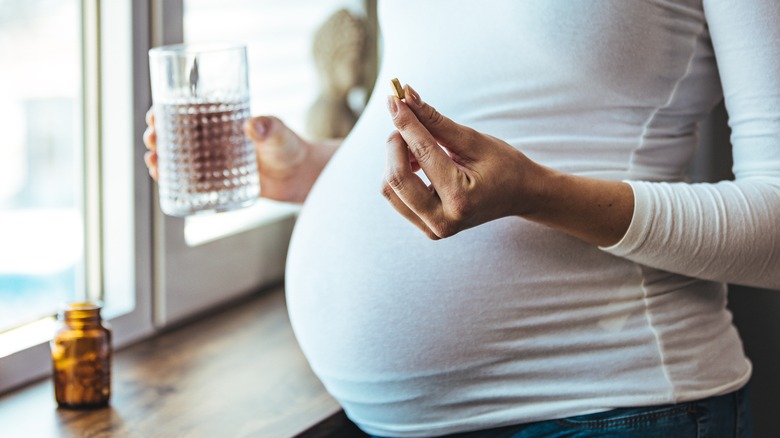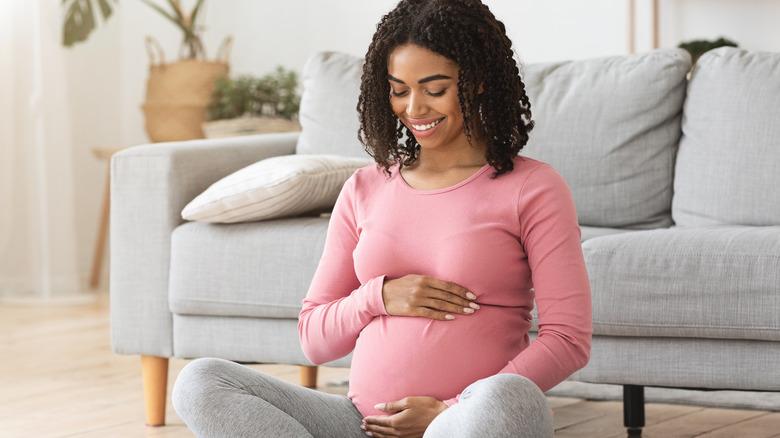Can You Get Pregnant While In Perimenopause?
If you're someone with a uterus and you reach your mid to late 30s without having a baby, you may start hearing from friends and family about how your biological clock is ticking and you're "running out of time." Even those of us who don't want kids are subject to this lecture far too often. However, as much as these comments can be annoying, upsetting, and even triggering, it's true: Fertility doesn't last forever. Eventually, whether we welcome it or dread it, we will all reach menopause.
Menopause is when your periods permanently stop, and you will know you've reached menopause when you haven't had a period for 12 consecutive months (via Cleveland Clinic). However, because we don't talk about menopause as much as we should, that also means that we discuss perimenopause even less. Perimenopause covers the years leading up to menopause when estrogen begins to decrease. For most people, perimenopause starts in their 40s and can last anywhere from seven to 14 years (via Medical News Daily).
Of course, as estrogen levels drop, the chances of getting pregnant decrease. At 38 years of age, 20% of people with uteruses are unable to conceive naturally. Three years later, at the age of 41, infertility rates jump up to 50%. At 45 years of age, 90% of people can't get pregnant without IVF or other modes of medical assistance. By 50 years of age, that percentage hits nearly 100 (via National Library of Medicine).
Despite the lowered chances of conceiving as you get older, there's something you should know before you toss out your favorite method of birth control: You can still get pregnant during perimenopause.
How does perimenopause pregnancy happen
Until you reach menopause, you still have a menstrual cycle. While your menstrual cycle may become irregular or go MIA for a few months before coming back into your life with fervor, the fact remains you're still menstruating. If you've had a period for most of your life, you're likely aware that your menstrual cycle involves ovulation, and if you're ovulating while having sex without some form of birth control, then pregnancy is a possibility. No matter how unlikely, there's still always a chance (via EverlyWell).
"Until a woman goes for a full year without a period, we still consider her potentially able to conceive," clinical professor of obstetrics and gynecology at the Yale School of Medicine and a certified menopause clinician Mary Jane Minkin, M.D. tells Glamour. "Physiologically, the ovarian function declines in perimenopause, but it's not a straight line. Some days the ovaries are working and sometimes they are not. So, although fertility certainly diminishes as we get older, it doesn't go to zero until you have a full year without a period."
That's why it's essential to track your menstrual cycle if your period doesn't show up for a couple of months in a row. You want to know when you've reached that 12-month mark so that you know you're in the clear when it comes to unplanned pregnancies.
How you can prevent a perimenopause pregnancy
Because you're still considered fertile until you officially hit menopause, if you don't want to have a perimenopause pregnancy, then you'll have to continue using contraception until you reach that period-free chapter in your life. However, it's worth noting that using hormonal birth control during perimenopause has possible side effects like heart disease, breast cancer, and an increased risk for blood clots (via The North American Menopause Society). Because of this, your doctor may recommend the hormone-free IUD or the mini pill, as it only contains progestin and is far safer for women over 40 (via Health Partners).
On the flip side, if you've been struggling to conceive and still want to, or you want to add another child to your family, then you should talk to your doctor about how to make a perimenopause pregnancy happen.
"The only thing a woman can do to improve her chances of getting pregnant is to be as healthy as she can be," Ob/Gyn Dr. Salena Zanotti, M.D. tells Parade. "Obesity and smoking decrease the risk of conception. And if she is not having regular cycles, she should see her provider or a fertility specialist as soon as possible."
The takeaway is that you can absolutely get pregnant during perimenopause! If this is something you don't want, then stick to contraception until you've been period-free for a year. If you do want to get pregnant and are able to, then know that your pregnancy will be considered high-risk (via Virginia Physicians for Women). Being high-risk means you won't have the same type of pregnancy as someone who's 30, but as long as you listen to your doctor and take all the necessary precautions, you just might be able to become a parent after 40.


